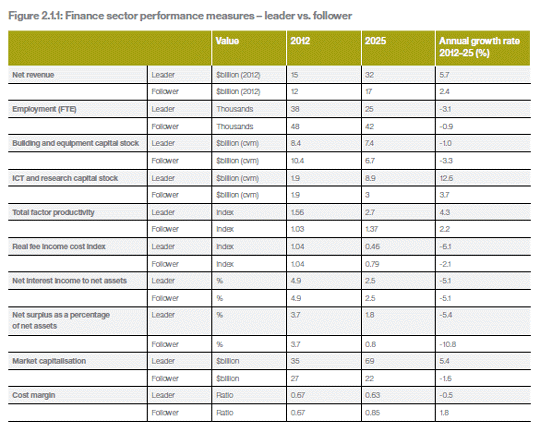By Gareth Vaughan
A report by IBM and Australia's National Institute of Economic and Industry Research (NIEIR) predicts financial institutions' fee income will drop 3.8% per annum over the next 12 years, with net interest income falling 4.7% a year over the same time period as the realities of a digital economy come to fruition.
The report entitled Reinventing Australian enterprises for the digital economy predicts increased competition and technology shifts will apply pressure to bank fee income and interest margins. IBM and NIEIR say the Australian finance sector, dominated by the parents of New Zealand's big four banks - ANZ, ASB, BNZ and Westpac - will maintain robust growth between now and 2025. But declining margins mean financial institutions will have to find significant revenue growth and productivity gains to maintain shareholder returns.
IBM and NIEIR also see major advantages for industry leaders and early adopters of new technology and systems, but suggest laggards will get left behind and struggle to catch up. (See more on this in the table at the foot of this story).
"We forecast that real fee income generated by financial institutions will decline by 3.8% a year on average from now to 2025. In practice, we expect that fees for some transactions will fall very sharply, but that institutions will find profits in areas where they can add significant and unique value."
In terms of increasing competition, the report suggests North American and European financial institutions will regain strength after the global financial crisis, and Asian institutions will flex their growing muscle.
"But the most dangerous threats are likely to emerge from other sectors in the form of airlines, utilities and supermarkets that are offering more financial services."
The threat from the internet
Then there's the internet, which makes it possible for individuals to borrow directly from investors without the help of a bank through the likes of peer-to-peer lending. New Zealand is set to become an early adopter of legislation for crowd funding and peer-to-peer lending as fund raising sources.
Other threats cited include global companies with new business models such as PayPal and Google, alongside major mobile devise makers like Apple and Samsung. (Also see our recent story on the Ernst & Young report Smart Commerce, Banks battle for customers at the frontline of digital retail.)
IBM and NIEIR also note technologies and systems that'll become the main standards for digital wallets and electronic payments will be determined globally, but will have major local implications.
"This impending rise in competition and shifts in technology are all expected to place pressure on the fees and interest margins that Australian financial institutions can charge."
And, as competition increases, net interest income as a percentage of net assets will fall.
"We forecast this to decline by 4.7% a year, bringing Australian banking back from having some of the highest interest rate spreads in the world and more towards global norms. In wealth management, trends towards self managed super funds will also put pressure on the major funds to show that their fees and net interest margins are competitive."
Branch networks tipped to survive
Banks are, however, tipped to retain significant branch networks. Albeit these will be reconfigured to be smaller and more specialised. This is something that, for example, ANZ NZ is already doing with its new "modular" branches.
IBM and NIEIR predict branches will therefore still swallow a significant amount of capital expenditure.
"This (branch) approach will allow Australian institutions to retain one of their key sources of competitive advantage: strong brands and the ability to offer customers 'real world', personalised services," the report says.
IBM and NIEIR suggest some fees will drop towards zero. Thus banks could instead earn income by collecting, analysing and reselling data relating to transactions rather than through the transactions themselves.
"The value of this data can already be glimpsed in the way some banks resell aggregated transactional information to business customers. This trend will be accelerated by innovations such as digital wallets, which will increase convenience for customers as well as the industry's ability to collect data."
Leaders versus followers
The IBM and NIEIR report modelled scenarios for 2012 to 2025, using stylised organisations based on existing companies or agencies. This, they say, shows the potential for improved economic outcomes for entities that lead compared with those that lag or are left behind.
NIEIR's executive director, Peter Brain, said the most striking message from the research is it'll become more and more difficult for followers to regain their market position once they lose it to leaders who move ahead with more sophisticated customer and supply chain integration, and better productivity.
"In turn, the research tells us that there is a real first-mover advantage for companies that act sooner rather than later when taking a leader position," Brain says.

See the full IBM & NIEIR report here.
This article was first published in our email for paid subscribers. See here for more details and to subscribe.
1 Comments
Don't worry too much about the banks Gareth. Although they whinged and complained about the compliance costs of the Anti-Money Laundering and Countering Financing of Terrorism Act 2009 (AML/CFT Act), they will soon be pointing out that every alternative to transfering funds, or indeed any form of banking that they don't get to take thier cut, is akin to giving the late Mr Bin Laden a donation.

We welcome your comments below. If you are not already registered, please register to comment
Remember we welcome robust, respectful and insightful debate. We don't welcome abusive or defamatory comments and will de-register those repeatedly making such comments. Our current comment policy is here.